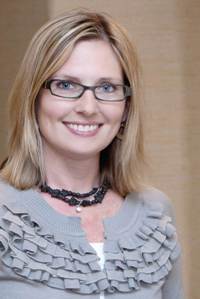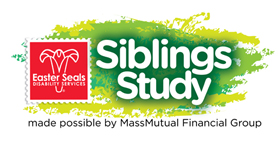Guest post by Lisa Peters-Beumer, MPH Assistant VP, Adult and Senior Services, Easter Seals
 A forgotten name, a burner left on, a lost destination, a missed birthday, a confused look, an unfamiliar reaction, an unstable gait ….
A forgotten name, a burner left on, a lost destination, a missed birthday, a confused look, an unfamiliar reaction, an unstable gait ….
Because changes–physical and cognitive declines–usually happen gradually over a long period of time with Alzheimer’s and cognitive impairments, family, friends and other caregivers often feel helpless and look for information and support along the way. They’re wondering how best to care for their loved one, and how to anticipate and plan for what’s next. And when their loved one has a great day—a lucid moment—and remembers the forgotten name or a grandchild’s birthday, a family experiences that loss all over again the next day. Spouses, friends, adult children alike often grieve for each one of these small changes, restore hope on the ‘good’ days, and privately grieve again the next; all the while making the best of their time together.
In the early stages, individuals with Alzheimer’s and their families seek information and need questions answered to understand services and supports available to them.
As the disease progresses, making safety and care incrementally more pressing, socialization and connectivity to the community require more facilitation. Services and supports must be activated at a time when families are already grieving losses large and small need to reach out for help. Sometimes grief can take the form of frustration or even depression among caregivers and it takes others outside of the immediate family to recognize this and start the ball rolling by gathering information or making some initial calls.
And what happens when siblings land in the role of primary caregiver? How does one prepare for this role change… from a brother or sister to a caregiver? From sibling to financial manager, care coordinator and primary support system–often later in life?
More and more we are seeing support groups and networks specifically for siblings—siblings of people with Alzheimer’s, as well as other cognitive disabilities. Click on: Easter Seals 2012 Siblings Study Findings.
With planning and support, and when families know what is available to them, services can be added incrementally. It may begin with a support group and a few hours of in home care to assist with personal care, prepare meals and provide medication reminders. As changes occur and needs increase, s/he might transition to an adult day center—offering caregivers respite a few days a week or allowing family caregivers to continue working during the day. And, perhaps at some point both adult day services and in home services will work together to help families with their loved ones living at home.
A family’s journey with Alzheimer’s requires information, support, planning and coordinated services as well as a real understanding of the frequent moments of hope, joy, and grief.
To learn more about Easter Seals and the Sibling Study visit www.easterseals.com









Caregivers as a whole are such an admirable, strong group of people, let alone when they have to care for their own sibling. Truly remarkable.